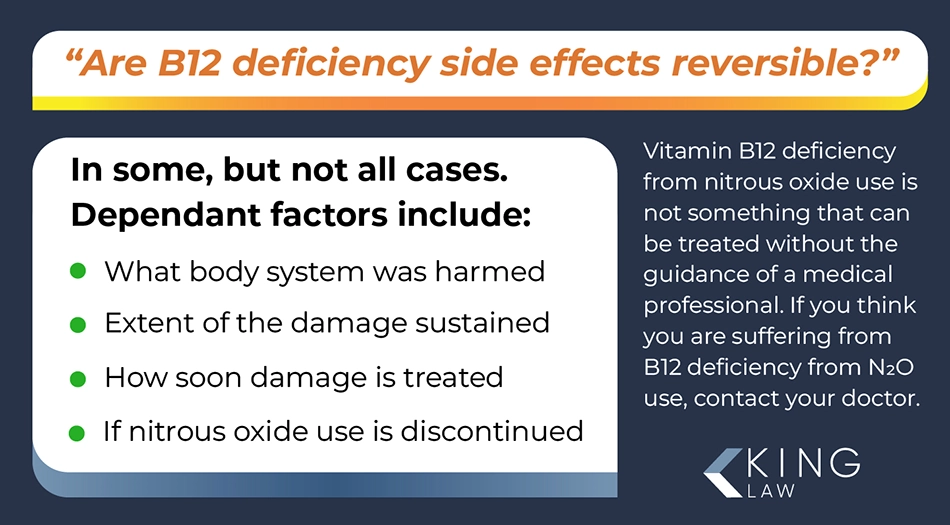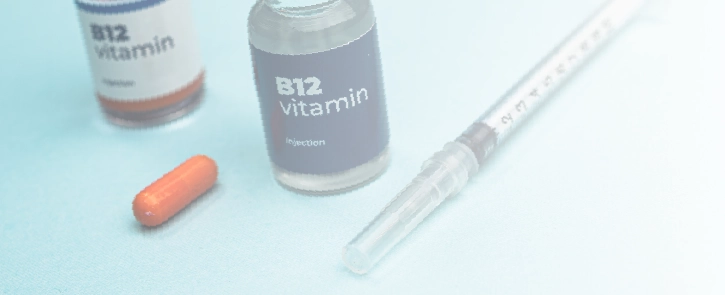Complete the form below to see if you qualify for a Whip-It Lawsuit

Nitrous oxide misuse can cause vitamin B12 deficiency and absorption issues, which can lead to nerve damage, paralysis, chronic numbness, and loss of coordination. People who use nitrous oxide recreationally may become unable to properly synthesize vitamin B12 inside their bodies. If you use nitrous oxide recreationally and experience issues with sensitivity or movement in your limbs, you should visit a doctor so you can receive prompt treatment and begin recovery.
This article helps you understand the causes and symptoms of a vitamin B12 deficiency caused by nitrous oxide misuse. You will also find information on treatment, key warning signs to look out for, and information about how long the symptoms may last. We also provide information on how someone can file a lawsuit against nitrous oxide companies if they experience complications due to vitamin B12 deficiency.
About the Nitrous Oxide B12 Deficiency Lawsuit
What Is Nitrous Oxide-Induced Vitamin B12 Deficiency?
How Can Nitrous Oxide Cause a Vitamin B12 Deficiency?
What Are Nitrous Oxide B12 Deficiency Symptoms?
How Long Does Nitrous Oxide Deactivate B12?
Are the Effects of Nitrous Oxide on B12 Reversible?
Vitamin B12 Treatment and Recovery
Have You Experienced Vitamin B12 Deficiency Due to N₂O Use?
King Law Is Accepting Nitrous Oxide and Vitamin B12 Deficiency Cases
What Is Nitrous Oxide-Induced Vitamin B12 Deficiency?
Nitrous oxide-induced vitamin B12 deficiency occurs when your body cannot get the vitamin B12 it needs because of nitrous oxide use. Nitrous oxide can change how your body processes vitamin B12. Even if you have enough vitamin B12 in your system, inhaling nitrous oxide can prevent your body from accessing and using the vitamin. Without available vitamin B12, you may experience severe and permanent neurological challenges, such as paralysis, numbness, and problems controlling your body’s movements.
Your body needs vitamin B12 in order for your nervous system to function properly and carry out cellular processes. Your body uses vitamin B12 to create and maintain your DNA, myelin, and neurotransmitters. Myelin is the protective coating around your nerve cells and parts of your neurons. It makes sure nerve signals go where they need to go. Neurotransmitters are chemicals your nerve cells use to send messages. Vitamin B12 also helps you convert amino acids into other chemicals your body uses to maintain healthy nerve cells. Vitamin B12 is important for health, and nitrous oxide use can result in damage to your nervous system.

How Can Nitrous Oxide Cause a Vitamin B12 Deficiency?
Nitrous oxide inactivates vitamin B12 in your body and makes it so your cells cannot use it to complete important processes. Vitamin B12 has a core made of another molecule (i.e., cobalt). Nitrous oxide changes the cobalt core to a different form, which keeps Vitamin B12 in the “off” position. When vitamin B12 is in the “off” position, your body is not able to use it to break down or create other chemicals (like amino acids and proteins) needed to keep your nerves and neurons healthy.
When this happens, your body cannot make or repair myelin, create or metabolize (break down) the chemicals your nerves need to talk to each other, and keep your red blood cells healthy. As a result, the nerve signals may go to places they should not, or you may have too much of other chemicals (like homocysteine) in your system. If these conditions are severe or left untreated, they can cause lifelong nerve damage or even death.
Vitamin B12 deficiency is not the only serious side effect of nitrous oxide use, so recreational users should monitor their health and watch for side effects like frostbite, signs of poisoning, or seizures.
Nitrous Oxide Use and Myeloneuropathy
When someone suffers from vitamin B12 deficiency due to nitrous oxide misuse, they may develop myeloneuropathy. This is the term for a nerve disorder that affects the spinal cord and peripheral nerves (nerves outside your brain and spinal cord). People who have myeloneuropathy may have trouble walking or balancing. The condition can be treated, but stopping nitrous oxide use is essential to recovery.
Nitrous Oxide Use and Anemia
Because nitrous oxide use can affect how your body absorbs vitamin B12, it can also lead to a condition called pernicious anemia. When you have this type of anemia, your body does not produce enough red blood cells because of a vitamin B12 deficiency. A B12 deficiency can also cause megaloblastic anemia, a condition where red blood cells are too large and do not function properly. People who use nitrous oxide can suffer from a range of blood disorders and hematological complications.
What Are Nitrous Oxide B12 Deficiency Symptoms?
Recognizing when you (or someone you love) have a vitamin B12 deficiency is key, so you can access the treatment you need to prevent long-term nerve damage. Here are some of the signs of B12 deficiency to look out for:
- Numbness, tingling, or a pins and needles feeling in the hands or feet (even if slight or minor)
- Falling or losing your footing more than usual or without reason
- Not being able to stay balanced
- Stiff muscles
- Vision changes
- Symptoms of psychosis (e.g., hallucinations, paranoia, disorganized thoughts, or schizophrenia-like symptoms)
- Severe or unusual tiredness
- Memory issues
Sometimes, these symptoms can develop gradually. However, some people with a nitrous oxide-induced vitamin B12 deficiency may wake up with severe symptoms all at once. If you experience any concerning or unusual symptoms, seek medical attention right away. Stopping nitrous oxide may not be enough for you to get better. You also need to be seen by a doctor immediately, to tell your doctor about your N2O use, and be given special treatments to help your nerves recover.
How Long Does Nitrous Oxide Deactivate B12?
Nitrous oxide inactivates vitamin B12 as soon as it enters your body. Sometimes, the effects will go away shortly after the nitrous oxide leaves your system. However, the effects might last longer if you inhale the drug multiple times per week or if you use a high dose at one time. Each time you huff nitrous oxide, it can be harder for your body to bounce back and start to use vitamin B12 and restore your nerve health.
Some people experience a long-lasting vitamin B12 deficiency after using nitrous oxide for the first time. This could be because they huffed a lot at the time, or they might have other health conditions (like anemia) or a pre-existing vitamin B12 deficiency. The sooner you stop inhaling N2O and get medical attention, the better your chances are of making a full recovery.
Are the Effects of Nitrous Oxide on B12 Reversible?
The symptoms of vitamin B12 deficiency may be reversible in some cases and permanent in others. Recovery can depend on how soon the person identifies the signs and gets help. Moreover, if the person gets treated for the vitamin B12 deficiency and uses nitrous again after treatment, it can undo whatever progress they had made towards recovery.
Another factor is the severity and type of symptoms they are experiencing. For example, people who are suffering from neurological damage (like nerve damage or a spinal cord injury) may take longer to heal, and a full recovery is not guaranteed. Someone who has anemia because of their nitrous oxide-induced vitamin B12 deficiency may recover more quickly and fully.

Vitamin B12 Treatment and Recovery
Getting treated for your vitamin B12 deficiency is key to putting you on the path to recovery. Here is what your treatment process might look like:
- Step One: Completely stop using nitrous oxide recreationally (even using it occasionally or in “low doses” could cause permanent nerve damage). If you are having trouble ceasing use, you should be honest with your doctor.
- Step Two: Go to the doctor and receive specialized vitamin B12 supplements (usually, this involves an injection every day or every other day, which is tapered down to monthly).
- Step Three: Get follow-up labs to monitor your numbers (such as your homocysteine levels).
- Step Four: Participate in occupational or physical therapy to help you regain strength and coordination.
If you suffer from a nitrous oxide addiction, your treatment may also involve going to therapy or a rehabilitation center to help you overcome this.
Supplements for B12 Deficiency From Nitrous Oxide Use
Keep in mind, you cannot treat your nitrous oxide-induced vitamin B12 deficiency on your own. You will likely need injections and supplements directly from your doctor. Here are some of the vitamin B12 supplements your doctor may give you:
- Vitamin B12 injections (typically, 1 to 2 mg of hydroxocobalamin injected into your muscles every other day for two weeks)
- Vitamin B12 tablets (once your levels are stabilized)
- Folate (your body needs folate to process vitamin B12 and vice versa)
- L-methionine (B12, folate, and L-methionine work together)
Your doctor may also want to check to see if you need other treatments because of a problematic immune response or another deficiency. Your doctor may perform scans and blood tests to find out what you need to recover. Treatment of nitrous oxide complications should occur under a doctor’s guidance. Also, be sure to tell your doctor that you use nitrous oxide. They will not be able to find out by testing your blood or urine. Being transparent can help achieve a more positive outcome through treatment.
Advice About Taking B12 Supplements Before or After Nitrous Oxide Use
People who use nitrous oxide may get advice from friends or online forums about the importance of taking B12 supplements before or after using nitrous oxide. Many people falsely believe that self-supplementing can protect them from complications of vitamin B12 deficiency. According to research, taking supplements may help you sustain vitamin B12 levels in your blood. However, your body cannot use that vitamin B12, and you will likely still have a functional deficiency, which results in the same dangers as an actual deficiency. This means taking supplements likely does not protect you from nerve damage and associated injuries.
Have You Experienced Vitamin B12 Deficiency Due to N₂O Use?
If you used nitrous oxide recently, take note of the symptoms you experienced during and after the high. For example, did you have any numbness, loss of coordination, extreme tiredness, weakness, or muscle stiffness? If so, these may be signs of a vitamin B12 deficiency.
Remember that nitrous oxide does not necessarily take away the vitamin B12 in your system. Instead, it usually prevents your body from using the vitamin B12 that your body has. So, your body may not be getting enough vitamin B12 even if your levels are within the normal range. Similarly, taking B12 supplements is unlikely to prevent cell damage caused by nitrous oxide use.
Talk to your doctor about your nitrous oxide misuse so they can give you the right recommendations. You may also be able to file a lawsuit against the nitrous oxide seller and manufacturer to recover your losses.
King Law Is Accepting Nitrous Oxide and Vitamin B12 Deficiency Cases
King Law is accepting cases involving people who were injured because of a nitrous oxide-induced vitamin B12 deficiency. Companies that make whipped cream chargers and cartridges may have been reckless and irresponsible in how they sold and advertised these products to the public. Many people misused N2O because of how the products were sold and marketed. Companies did not properly warn people of dangers and made their products available in places where drugs and paraphernalia were sold. Because of their negligence, you may be entitled to compensation for nitrous oxide-related injuries.
Contact a Nitrous Oxide Lawyer Today
If you suffered from a vitamin B12 deficiency caused by nitrous oxide, reach out to our law firm today by calling (585) 496-2648 or filling out the form to schedule a free consultation. We can talk to you about what happened to you and let you know if you have a legal claim against the at-fault companies. Our team of attorneys is ready to represent you in a nitrous oxide lawsuit.
Our team has a long history of fighting for victims of unsafe products, like nitrous oxide, sold by companies that were dishonest about the risks. We can help and have demonstrated success going up against corporate manufacturers. Learn more about your legal options today.

